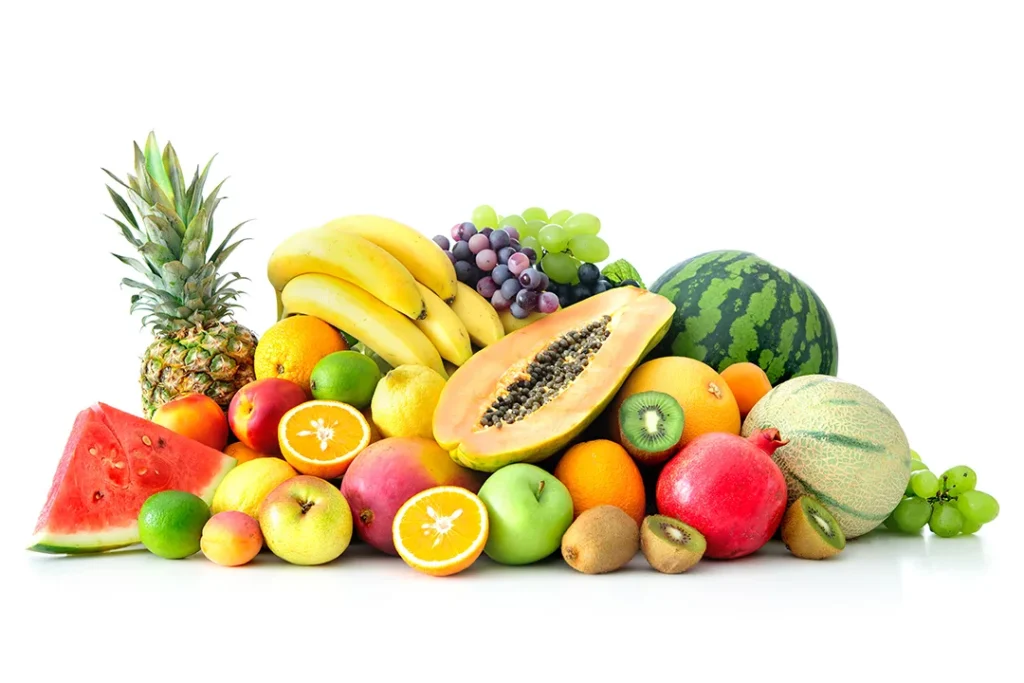Diabetic Patient Can Eat Fruits
Fruits are good source of nutrients important for overall health including fiber, antioxidants, vitamins and minerals. Many fruits are low to moderate GI foods, meaning they raise blood sugar levels more slowly than high GI foods. Fruit fiber slows absorption and digestion of sugar which also helps control blood sugar levels.

Why Fruits Are Safe for Diabetics
Required elements in fruits are also good for people with diabetes. They are rich:-
Vitamins and Minerals: Fruits such as oranges are rich in antioxidants, potassium and vitamin C providing important nutrients that promote general health.
- Dietary Fiber: Fiber rich fruits help reduce rate of sugar absorption, thus reducing risk of blood sugar spikes. For diabetics who are more likely to develop cardiovascular disease fiber is specially important because it promotes heart health and help in digestion.
- Antioxidants: Fruits high in antioxidants such as strawberries and blueberries may help reduce inflammation and reduce risk of diabetes related problems including heart disease.
Factors to Consider When Eating Fruits as Diabetic
1. Glycemic Index of Fruits
Foods are ranked on scale called glycemic index based on how they affect blood sugar levels. For diabetics foods with low GI (55 or less) cause slower, more gradual rise in blood sugar. Foods with GI of 56-69 are still OK in moderation although foods with GI of 70 and above should be avoided.
Low GI Fruits (Best Choices for Diabetics)
- Berries: Blackberries, raspberries, blueberries and strawberries are high in fiber and low GI.
- Apples: Low GI apples are excellent source of antioxidants, fiber and vitamins.
- Pears: Rich in fiber and low in calories pears are excellent food choice for controlling blood sugar.
- Plums: A low GI sugary fruit that’s OK in moderation.
- Peaches and Apricots: Packed with nutrients they both have mild effect on blood sugar levels.
- Cherries: Packed in antioxidants and low GI.
- Citrus Fruits: Lemons, oranges and grapefruit are healthy options that provide fiber and vitamin C while stabilizing blood sugar.
Medium GI Fruits (Eat with Caution)
- Bananas: With moderate GI specially when ripe these should be eaten in moderation.
- Pineapple: Although it has moderate GI limited portions of this fruit can be included in diabetic diet.
- Watermelon: Due to their modest GI honeydew and cantaloupe should only be eaten in moderation.
High GI Fruits (Which Should Be Limited)
- Watermelon: This fruit has a high GI and can quickly raise blood sugar levels.
- Grapes: Due to their high sugar content specially red and purple varieties can cause rapid rise in blood sugar.
- Mango: Sweet and heavy in sugar so moderation is advised.
2. Portion Control
Fruits are nutritious but they still contain natural sugars such as fructose which can increase blood sugar levels. Portion size control is key to including fruit in diabetic diet.
For example: Half grape, a cup of berries or small apple can be considered serving size. A small piece of fruit contains about 15 grams of carbohydrates which is recommended amount for serving of fruit according to American Diabetes Association.
Diabetics can enjoy variety of fruits without experiencing massive blood sugar spikes by controlling their portion sizes.
3. Fiber Content in Fruits
Because it slows digestion and absorption of sugar into bloodstream. Fiber is critical nutrient for diabetics. Slow release of sugar reduces risk of blood glucose spikes. Fiber rich fruits include:
- Apples: Contains both soluble and insoluble fiber to help control blood sugar and cholesterol levels.
- Pears: Packed with fiber per serving pears are great option for people with diabetes.
- Berries: Packed with antioxidants and fiber berries help regulate blood sugar levels.
4. Timing of Fruit Consumption
Eating fruit with meals high in protein or good fats will help lower blood sugar levels by slowing down absorption of sugar. Balance is added to meal by for instance eating berries with yogurt or apple slices with handful of nuts.
Fruit should not be consumed by diabetics when they are fasting since it can cause their blood sugar levels to spike.
Benefits of Eating Fruits for Diabetics
1. Nutrient Dense
Rich in vitamins, minerals and antioxidants fruits promote general health and help manage diabetes. For example citrus foods contain vitamin C which can help reduce inflammation and boost immunity.
Oranges and bananas contain potassium which is required for controlling blood pressure in diabetics who are at risk of hypertension.
Berries contain antioxidants that reduce oxidative stress and thus reduce risk of problems linked to diabetes including nerve damage and heart disease.
2. Better Blood Sugar Control
Fiber in fruits specially those found in apples, pears and berries can help control blood sugar levels by delaying breakdown and absorption of carbohydrates.
3. Weight Management
Fruits are wonderful food choice for diabetics trying to maintain healthy weight because they are generally rich in nutrients and low in calories. Controlling blood sugar and reducing risk of complications depends on weight control.
Fruits to Be Eaten in Moderation
All fruits are healthy but people with diabetes should avoid certain fruits that are high in sugar. As examples consider:
- Bananas: Bananas can raise blood sugar quickly, specially when they are overripe. Choose green small bananas they contain less sugar.
- Mangoes and Grapes: Eat in medium as they are high in natural sugars.
- Watermelon and Pineapple: Although they are cooling they have high GI rating and should be avoided if blood sugar regulation is issue.
Practical Tips for Including Fruits in Diabetic Diet
1. Choose whole fruits instead of fruit juices: Fruit juices often contain little fiber and can raise blood sugar levels. In contrast whole fruits provide fiber which helps regulate blood sugar levels.
2. Check blood sugar: After eating fruits diabetics should check their blood sugar levels frequently to see how their body reacts and adjust portion size.
3. Avoid dried fruits: Concentrated sugar found in dried fruits such as raisins and dried apricots can cause sudden spike in blood sugar levels.
Conclusion
Fruits can be healthy and balanced element of diet for diabetics but they must be carefully selected, portioned and balanced with other nutrients such as protein and fat. Diabetics can reap benefits of fruit and maintain stable blood sugar levels by focusing on low GI, high fiber fruits and controlling portion sizes.
